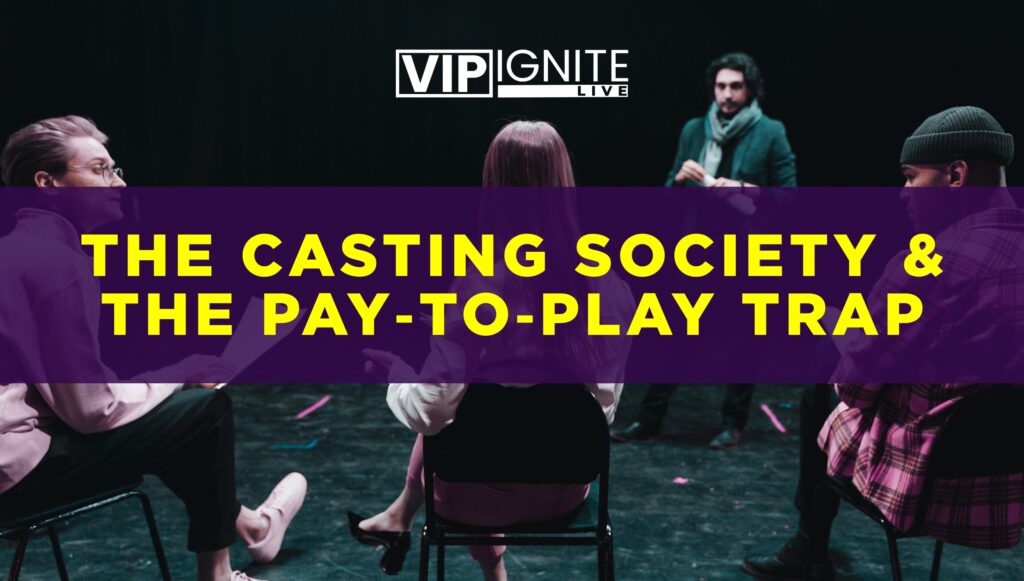
1. Who Is the Casting Society?
The Casting Society (formerly Casting Society of America, CSA) is the professional body of roughly 1,200 working casting directors and associates across film, TV, theater, commercials and new media in the U.S. and around the world. It was founded in Los Angeles in 1982 and rebranded in February 2022 to reflect a more global membership.
Membership is voluntary—not a union—and the Society is best known for presenting the prestigious Artios Awards, honoring excellence in casting across multiple categories each year .
Importantly, CSA members are paid by the production—not by actors. Their role is to cast the right actor, not to sell access or extract money from talent.
2. Pay‑to‑Play: What It Is and Why It’s Problematic
The Rise of Casting Director Workshops
A lucrative side-venture some casting professionals have pursued is offering workshops or showcase events—often led by “emerging” or low-level casting directors—where actors pay a fee to perform an audition-like scene in front of them. These are sometimes marketed as networking, feedback, or industry exposure opportunities.
However, this raises a fundamental ethical and legal issue: should actors pay to be seen?
When “Education” Becomes Exploitation
On paper, some of these workshops are billed as educational: actors learn and receive coaching. But critics argue this masks a pay‑to‑play dynamic. As one industry commentator put it:
“actors should pay as much as we can to even the playing field? No. Shame on Casting Directors and others who pay to be seen. It is not…”
Legally, the Talent Scam Prevention Act targets these setups, focusing not on shutting down workshops entirely, but on eradicating the quid‑pro‑quo payment-for-access model. In early 2017, authorities charged multiple casting‑workshop operations—some associated with recognized casting directors—for illegally charging actors to audition. In 2018, casting director Lindsay Chag was convicted of violating the law for her pay‑to‑play workshops .
Indeed, even within the profession, there’s an ethical line drawn: a casting director is hired to find talent, not to profit from actors’ desperation.

3. CSA’s Role: Protecting Actors & Upholding Standards
Scam Warnings and Reporting Procedures
In recent months, the Casting Society—through its public safety initiatives—has issued high-profile warnings to actors about impostor scams on social media and direct messages.
CSA’s president Destiny Lilly stated:
“These are literally scams, like a random person saying, ‘I am a famous casting director and I need you to send me $500 so I can set up your travel for an audition…’”
These scams often impersonate legitimate casting professionals and ask actors to pay fees for phony auditions or callbacks. CSA urges actors to authenticate identities and report any suspicious requests via its official channels .
Collaboration with Casting Platforms
Platforms like Casting Networks work closely with CSA to vet listings and prevent fraudulent postings. They encourage actors to:
-
- Submit only through trusted, verified sites.
- Never pay to audition or share personal financial information outside of formal job contracts.
- Report suspicious opportunities immediately.
The collaboration reflects a broader mission: casting should match talent and roles—not expectations and wallets.
4. Real Costs to Actors: Financial & Emotional
When Unpaid Labor Becomes Paid by the Actor
Actors routinely invest time, money and emotional energy in unpaid auditions. A New Yorker exposé noted how remote self-tapes shifted much of the casting work onto the actor: sourcing a scene partner, equipment, lighting—and often waiting days to find out they didn’t get the role.
One actor, Tavi Gevinson, described a self-tape process:
“I spent the next few days memorizing… rearranged the living‑room furniture… compared takes… then sent it off… another actor was offered the role days earlier.”
Labor advocates within SAG-AFTRA have revived a clause from a 1937 contract that argues for audition pay, noting that actors provide valuable services (memorizing, taping, acting) for nothing—which saves producers millions annually.
Emotional Toll
Veteran actor Caryn West has witnessed the evolution:
“We went into rooms… they saw the entire audition. With self-tapes, casting mostly just type people out.”
Actors now face isolation, self-doubt, and a mental health burden seldom acknowledged. When in-person callbacks and direction are replaced with cold digital filters, creativity and confidence often suffer.
5. Why Legitimate Casting Directors Don’t Charge Actors
It’s Hercules vs. the Hydra
-
- CSA-certified casting directors earn fees from production companies—not actors.
- Their role is solely to evaluate talent and make casting recommendations.
- Charging actors undermines the industry’s core integrity.
Risk of Diluting Trust
-
- Workshops that charge for access can tarnish the industry’s reputation.
- Actors may confuse low-level, paid-access events with professional casting processes.
- This erodes trust between actors and legitimate casting teams.
6. What Actors Should Do—Safely
✅ Only audition through trusted channels
-
- Use official platforms like Casting Networks or Spotlight.
- Never submit if asked to pay an audition fee.
✅ Vet opportunities
-
- If someone reaches out via social media, insist on switching to verified email and documentation.
- Confirm their CSA membership and production details.
✅ Don’t fall for “Exposure”
-
- A legitimate casting opportunity gives you script, sides, contact, dates—and does not demand payment.
- Workshops billed as coaching or feedback should be transparently priced and not implicitly tied to booking chances.
✅ Support industry reform
-
- Actors can lend voice to initiatives calling for audition pay and stronger protections.
- Share warnings and scam alerts within your community.
- Report suspicious workshops or casting solicitations to CSA or Casting Networks.

7. Quotes & Quick Facts (For Research Highlights)
Quote / Fact Source
“Actors should pay as much as we can to even the playing field? No… Shame on Casting Directors and others who pay to be seen.”
Lindsay Chag convicted under Talent Scam Prevention Act for pay-to-play casting workshops
“These are literally scams… I am a famous casting director… send me $500…” — PSA from CSA president
Remote self-taping has offloaded heavy audition labor onto actors
SAG advocates are pushing audition pay from a seldom‑used 1937 contract clause
8. Final Word: Protect Your Craft, Not Someone’s Paycheck
Every actor—seasoned or emerging—needs to internalize this:
If someone asks you to pay for an audition, callback, or access to a casting professional, it’s not a job—it’s exploitation.
That person is not a professional casting director conducting legitimate casting business. They’re using your hope as currency.
Let your craft speak—not your wallet. You deserve legitimate exposure, not pay-to-play schemes. The Casting Society, talent platforms like Casting Networks, and union advocacy are all working toward safer, fairer casting. But the most powerful protections come from actors themselves—by saying “no,” questioning offers, and amplifying industry standards over desperation.
Call to Action
👥 Share this post among your acting peers.
🕵 If you’ve encountered a suspicious casting request or workshop that charges for audition access, report it to the Casting Society via their official contact form.
Together, artists can uphold an industry where talent—not tuition—is the ticket.
“It’s all about people skills and networking and that is what we offer.” – Alycia Kaback


Recent Comments